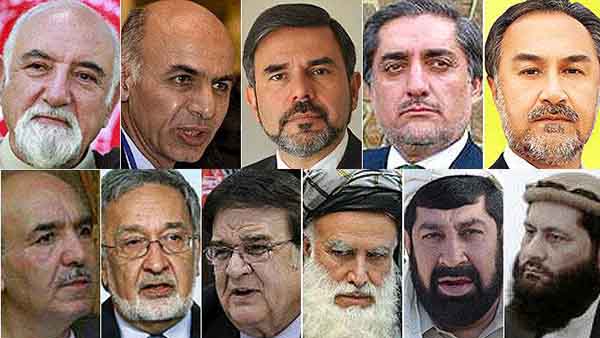Yesterday, Feb. 2, the presidential election campaign formally kicked off under heavy rainfall in Kabul city. 11 presidential nominates have the chance to carry out their campaigns and win the hearts and minds of people. The commencement of the campaign was ostensibly satisfying. As despite heavy rainfall, thousands of people accompanied candidates to present their agenda of getting the country out of mayhem. On the very first day of campaign, four presidential candidates who are deemed to have higher chances to win the election throw away huge gatherings where thousands of people took part. Candidates have around two months to win the hearts and minds of people, the period many of them criticized of not being enough to share their agenda and convince people to vote for them. Saying that they need at least few days to go to each 24 provinces of the country and encourage people to participate in election and cast their votes.
The militants will also be looking to capitalize if the vote is marred by rigging and feuding between rivals seeking to replace President Hamid Karzai, who cannot run for a third term under Afghan law. Whoever replaces him will inherit a country beset by deepening anxiety about security as most foreign troops prepare to pull out by the end of the year, leaving Afghan forces largely on their own to battle the insurgency. Series of attacks in Kabul city have disheartened part of people to join gatherings and make the oven of campaign hotter.
The first of the day of the campaign looked cool. Candidates shared their thoughts and plans of future, however, not much concrete to get satisfaction of people. They all somehow focused on key concerning issues such as security, insurgency, job creation and combating corruption. But let’s see who can present far a concrete plans for combating issues that have grasped the Afghan society. However, due to short period of campaign, candidates may accumulate their energy and focus on emotion-sparking slogans rather than presenting tiresome list of agendas.
Anyhow, stares set on the upcoming elections and the behavior of candidates. The overruling social and political disintegration largely depend on how the candidates and their respective parties play and ultimately deal with the result. In former elections, none of the candidates accepted the result of the election. Each openly claimed the announced percentage of the vote had nothing to do with their popularity among people because their votes were rigged. If similar incident happens this time, then the situation might get far complicated. To protect the system and prevent any destructive movements, there is need of strong pressure to keep the people tight together. The possibility is too high for break out of chaos if the pressure is lifted up.
So, certainly with the presence of international community, no one dared to embark to destructive activities because foreign forces had the mandate to protect the system. Therefore, despite grave resent among politicians in previous elections, no one called for any action which could disrupt the security situation. But the same scenario may not be repeated this time. If the election becomes fraudulent, the candidates will stand to a level that might possibly make the control elapse. However, a visible part of foreign security forces are still in the country and will be till the time of election but security responsibilities have been already handed over to Afghan security forces.
The government should try its best to weaken the possibility of fraud. A major vote rigging would pave the way for groups which are funded by politicians for spoiling peace and stability. The involvement of such disruptive groups will open up evil.
Secondly, in both previous elections, people generally voted on communal line. Each community had their own candidates particularly in first election. After the success of President Karzai, he also tried to somehow relieve each ethnic group by the so-called proportionate distribution of power. Each ethnic group was satisfied their influential figure was on the power irrespective of their capacity and strength whether they could do something for the nation or not. Number of those influential leaders neither had the experience nor knowledge to push forward and do something for their country. As analysts believe, that part of the failure of government was related to this issue. Individual and figures were appointed on account of compromise or political expediency not because of their merits.
Regretfully, the coming elections and candidates to some extent are stripped of such characteristics. Influential leaders have taken the back stage because they served their full term or lost popularity among civilians during 12 years. Nonetheless they try to lead the situation from back stage. Some new figures have appeared on the political stage from their addresses. Any particular candidates did not care about communal proportion rather looked much about vote banks. In other words, this time candidates are acting much more like political parties unlike previous ethnic combination. This is a step forward for democracy because it reflects that politicians may increasingly take away from communal scenario and rather try to become national players. Additionally, the present controversy between President Hamid Karzai and Washington has further clouded the situation. President Karzai refuses to sign Bilateral Security Agreement (BSA) which he previously was strongly supporting and still maintain it is good for his country but with conditions. If Washington pulls all of its troops, much of the aid that pays for government and security is likely to dry up.

